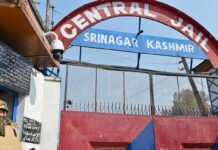By Masood Hussain

I am pretty embarrassed; I told the official function of the SHRC, the main official watchdog for civil liberties in the state, on the World Human Rights Day, for two reasons. Firstly, while reaching the SKICC, far away from the population whose rights the institution is supposed to protect, I had to cross many barriers of concertina barriers. This led me to think if I was going to mourn the human rights or to celebrate it.
Secondly, in the function that has state’s Chief Secretary B B Vyas and the police chief Dr S P Vaid on one side and the entire government functionaries in the audience, I am in fact the only “civilian” in the entire function.
The function, to which I was deputed by the Kashmir Editor’s Guild, however, offered a rare set of ears on the key issue of human rights, an issue that has literally swallowed all other issues in last three decades. The debate over human rights took me to the World Human Rights Day of 1989. Then, the Radio Kashmir Srinagar was running a brief morning talk capsule Aaj Ki Baat. Incidentally, that talk was assigned to me. A young reporter with just three years experience, I genuinely did not know much about human rights. So, I purchased an Urdu book to understand its evolution. Tragically, that was the last talk broadcast under Aaj Ki Baat banner. In the subsequent days, the situation on ground explained what human rights are all about.
Media is perhaps the first contact between the victim and, invariably with the violator. Media’s rare edge over all other institutions made it an instant target. That was the principal reason, why media believes, as many as 16 of the working journalists were brutally killed. The tragedy is that the media fraternity or the bereaved families still do not know why they were killed and who was behind these murders.
What is the harm, I argued, in reopening these cases, when the systems are invoking cases as old as 1984 against certain people? Not might alone, but with an impressive accountability, can institutions get their credibility.
Killings apart, I insisted, that various institutions of governance did not spare the media later and attempted, very seriously, though unsuccessfully, to hit its credibility. It started in the aftermath of Kunan rapes and continues to date. This is despite the fact that KEG has a position which is sort of a challenge: Identify the event that was reported or misreported?
The SHRC boss’ Justice (retd) Bilal Nazki asserted that the media carries every news generated within the files and the courtroom of the Commission, but rarely comments on its performance. I believe the Commission is mandated to cry and not to bite and that is why the newsrooms see the Commission more of an extension of the state. But that is beside the point.
Law Minister Abdul Haq Khan and Chief Secretary, in their respective interventions, were very positive towards the media in the state. Nobody, however, offered even a hint that the cases would be investigated.
Skipping the historical baggage of the debate, I made three points, all about the basics of the crisis. I referred to a recent narrative about a Uri village where an unfortunate woman has been reduced to the status of a wreck. A resident of Zamoor Pattan, her husband teacher was summoned by an army officer and never returned, alive or dead. Scared, her parents in law took away her two sons and crossed the LoC to the other side of Kashmir leaving her and their own daughter here. Had she been in Srinagar, she would have got all privileges of the widow of an employee who was killed in harness, a job, and compensation but living on the hills and overlooking the bus moving towards Kamman Post, every week, she is not in a position to trace even her sons. This is where an institution like SHRC can intervene and invest in their credibility.
Since I belonged to the same generation that took up the gun, I said, a generation is already over, killed and buried in the most productive phases of their lives. Now, the new age militancy has revived in a sort of a greenhouse without arms and access to training. I insisted that while ideology may or may not be playing a role, one thing that is key element is the humiliation and revenge. It has been the reason in cases of some cops who deserted. Why can the government not have adequate systems in place to prevent this factor?
A stone pelter, I insisted, if somehow gets a gun is a militant, legally. But technically and ethically, he is not a militant because guns are very sophisticated these days. My point was that states are inherently emotionless but individuals cannot give up the emotion.















